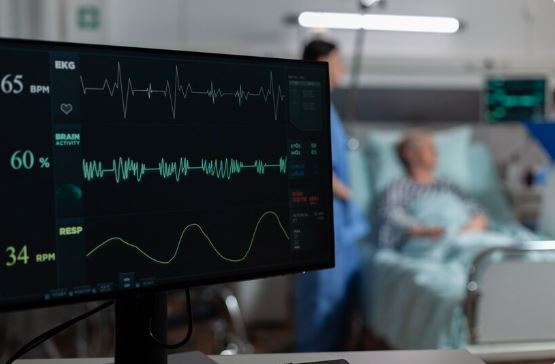Atrial Fibrillation (AFib) is one of the most common heart rhythm disorders affecting people across the world. Characterized by an irregular and often rapid heartbeat, AFib increases the risk of stroke, heart failure, and other cardiac complications. As medical science evolves, a question frequently asked by patients is: Can Atrial Fibrillation be cured?
In this article, we dive deep into the possibilities of curing Atrial Fibrillation, review the latest global research, and highlight modern treatment strategies. We also share expert insights from Dr. C. Raghu, one of the best cardiologists in Hyderabad, to help patients understand how they can manage and potentially overcome AFib.
What Is Atrial Fibrillation?
Atrial Fibrillation is a condition where the heart’s upper chambers (the atria) beat irregularly due to faulty electrical signals. This disrupts the normal rhythm of the heart, often leading to a fast and chaotic heartbeat.
Some people may live with Atrial Fibrillation for years with mild symptoms, while others face serious issues like fatigue, palpitations, dizziness, chest discomfort, or even blood clots and stroke.
Can Atrial Fibrillation Be Cured?
The short answer is: Atrial Fibrillation may not always be completely “cured” in the traditional sense, but it can be effectively managed or even reversed in many patients, especially with early intervention.
Curable vs. Manageable: Understanding the Difference
- Paroxysmal AFib (episodes that come and go) can often be reversed with medication or procedures like cardioversion or catheter ablation.
- Persistent or long-standing AFib may require ongoing treatment, but recent advancements offer hope for long-term rhythm control.
- In cases where AFib becomes permanent, the focus shifts from cure to control—maintaining a healthy heart rate and preventing complications.
- This distinction is vital, and it is best understood with guidance from a trusted heart specialist like the best cardiologist in Hyderabad.
Latest Research on AFib Treatment
Recent advancements in cardiology have opened up promising avenues for the treatment of Atrial Fibrillation. Here are some of the cutting-edge developments:
1. Catheter Ablation Techniques
Catheter ablation has become a preferred treatment for many AFib patients. The procedure targets and destroys the faulty electrical areas in the heart. According to studies, catheter ablation has a success rate of 70-80% in selected patients, particularly those with paroxysmal AFib.
Ongoing research focuses on refining ablation tools, including pulsed field ablation (PFA), which is less invasive and more precise, reducing damage to surrounding tissues.
2. Hybrid Procedures
A combination of catheter and surgical ablation, known as a hybrid ablation, is being explored for patients with persistent or long-standing AFib. This procedure shows improved success in maintaining sinus rhythm over time.
3. Personalized Medicine
Genetic testing and AI-driven diagnostics are now being used to personalize treatment plans. These innovations help predict treatment outcomes and select the best strategy for each patient.
4. Lifestyle & Risk Factor Management
Modern research emphasizes the importance of managing underlying conditions like obesity, sleep apnea, diabetes, and hypertension. Addressing these issues can reverse or significantly reduce Atrial Fibrillation episodes.
Who Is an Ideal Candidate for Curative Treatment?
While not everyone can be “cured” of AFib, some patients are excellent candidates for procedures that may restore long-term rhythm control. These include:
- Patients with paroxysmal AFib
- Those with structurally normal hearts
- Individuals without significant underlying chronic disease
- Patients who respond poorly to medication
- Consulting the best cardiologist in Hyderabad ensures a comprehensive evaluation to determine if you’re eligible for curative treatment options.
Role of Medication in AFib Management
For many patients, medication remains the first line of defense:
- Antiarrhythmic drugs help restore and maintain normal rhythm.
- Beta-blockers and calcium channel blockers control heart rate.
- Anticoagulants (blood thinners) reduce stroke risk by preventing clot formation.
It’s important to understand that medications may manage symptoms but may not cure the root cause of Atrial Fibrillation. Therefore, regular follow-ups and adjustments in the treatment plan are essential.
Lifestyle Modifications That Help
Latest research strongly supports the role of lifestyle in managing and potentially reversing AFib:
- Weight management: Studies show that a 10% reduction in body weight improves AFib outcomes.
- Sleep apnea treatment: CPAP therapy for sleep apnea reduces AFib recurrence.
- Alcohol moderation: Excessive alcohol increases AFib risk. Cutting back can significantly reduce symptoms.
- Stress management: Mindfulness, yoga, and meditation help in reducing triggers.
Dr. C. Raghu, a highly experienced interventional cardiologist and widely regarded as the best cardiologist in Hyderabad, emphasizes holistic management of AFib, combining medical treatment with lifestyle improvements for best results.
Advanced Interventions and Monitoring Tools
Apart from ablation and medication, new tools are enhancing AFib care:
- Implantable Loop Recorders: These devices track heart rhythm over time, helping in accurate diagnosis and treatment decisions.
- Left Atrial Appendage Closure (LAAC): For patients unable to take long-term anticoagulants, LAAC devices (like the Watchman) prevent stroke by sealing off the left atrial appendage.
These advanced interventions are offered by leading heart specialists. If you are seeking cutting-edge care, it is advisable to consult the best cardiologist in India, such as Dr. C. Raghu, who specializes in complex cardiac arrhythmias.
Is It Safe to Live With Atrial Fibrillation?
With modern treatment and proper care, Atrial Fibrillation can be managed safely. Many patients live long, active lives by following their doctor’s recommendations, managing underlying conditions, and sticking to their medications.
However, untreated or poorly managed AFib can lead to serious complications such as:
- Stroke
- Heart failure
- Cognitive decline
- Reduced quality of life
- Hence, timely diagnosis, appropriate treatment, and regular follow-ups are essential.
When to Consult a Cardiologist?
If you’re experiencing symptoms like irregular heartbeat, fatigue, shortness of breath, or dizziness, it’s essential to consult a specialist immediately. The earlier Atrial Fibrillation is diagnosed, the higher the chances of effective treatment or even reversal.
For expert care, you can consult Dr. C. Raghu, a leading Interventional Cardiologist and one of the best cardiologists in Hyderabad, known for his expertise in diagnosing and managing complex heart rhythm disorders.
Conclusion
While not always permanently curable, Atrial Fibrillation is a highly treatable condition today. With advances in ablation technology, medication, and lifestyle intervention, many patients achieve complete rhythm control and symptom relief.
If you or a loved one is dealing with AFib, don’t delay seeking expert advice. The right care at the right time makes all the difference. Book an appointment with Dr. C. Raghu, the best cardiologist in Hyderabad, to explore the latest, most effective treatment options for Atrial Fibrillation.
- Can Atrial Fibrillation Be Cured? Latest Research & Insights
- Atrial Fibrillation (AFib) is one of the most common heart rhythm disorders affecting people across the world.
- Atrial Fibrillation, Atrial Fibrillation Treatment, best cardiologist in Hyderabad
Related posts:
 Best Topical Finasteride & Minoxidil Spray for Hair Regrowth
Best Topical Finasteride & Minoxidil Spray for Hair Regrowth
 What Are the Key Considerations Before Getting Filler Injections?
What Are the Key Considerations Before Getting Filler Injections?
 Dr. Kami Hoss Gives Out the Truth About Brushing & Flossing-Protecting Your Teeth
Dr. Kami Hoss Gives Out the Truth About Brushing & Flossing-Protecting Your Teeth
 Blue Grass Guppy: A Mesmerizing Addition to Your Aquarium Life
Blue Grass Guppy: A Mesmerizing Addition to Your Aquarium Life
 How to Know If You Need to See a Gastro Doctor for Stomach Pain
How to Know If You Need to See a Gastro Doctor for Stomach Pain
 How Massage Therapy Can Improve Your Health: A Guide for Queens Residents
How Massage Therapy Can Improve Your Health: A Guide for Queens Residents
 A Complete Guide on the Pricing of the Composite Bonding in London
A Complete Guide on the Pricing of the Composite Bonding in London
 Your brief and useful guide to removable orthodontic appliances
Your brief and useful guide to removable orthodontic appliances






